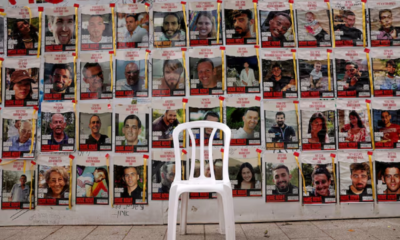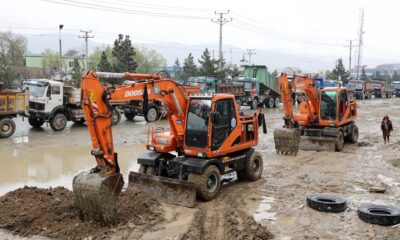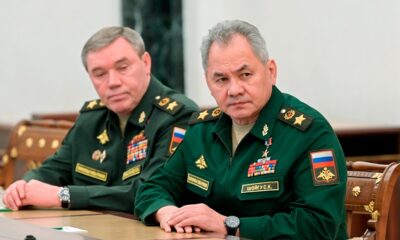Regional
Commandos rescue 2 children from dangling cable car in Pakistan
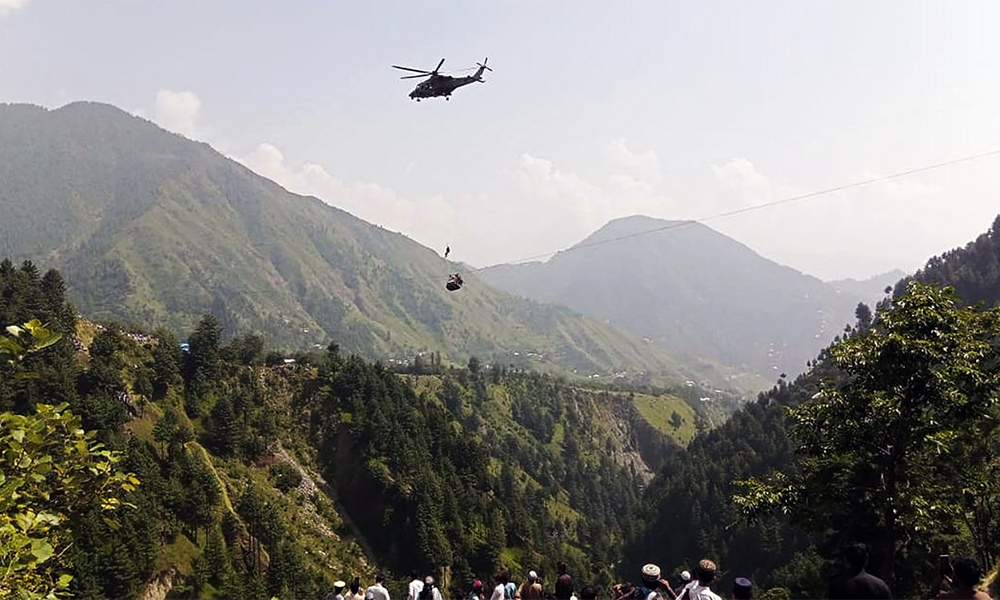
Army commandos dangling from helicopters plucked two children from a broken cable car suspended hundreds of meters above a canyon Tuesday in a remote part of Pakistan, the military said. Four more children and two adults still awaited rescue as night fell.
The military said in a statement that the rescue mission was still underway. Footage on TV stations showed a child in a harness being pulled to safety. The commandos’ rope could be seen swaying in the wind against the mountainous landscape Associated Press reported.
An expert described the rescue as extremely delicate because the wind generated by the helicopter blades could further weaken the remaining cables holding the car aloft.
Relatives of those trapped prayed while anxiously watching the operation unfold. The rescue also transfixed the country as Pakistanis crowded around televisions in offices, shops, restaurants and hospitals.
According to Pakistani TV stations, some of those trapped were in contact with their families by cellphone. Authorities said the two adults were consoling the children, who were between the ages of 11 and 15.
One of the cables snapped while the eight passengers were crossing a river canyon Tuesday morning in Battagram district in Khyber Pakhtunkhwa province. The children had been on their way to school.
Villagers frequently use cable cars to get around Pakistan’s mountainous regions. But the cars are often poorly maintained, and every year people die or are injured while traveling in them.
Helicopters were sent to attempt to pluck the people from the cable car but only after the group spent six hours precariously suspended 350 meters above ground, according to Taimoor Khan, a spokesman for the disaster management authority.
Pakistan’s caretaker prime minister, Anwaar-ul-Haq Kakar, wrote on X that he ordered authorities “to urgently ensure safe rescue and evacuation” of the eight people.
“I have also directed the authorities to conduct safety inspections of all such private chairlifts and ensure that they are safe to operate and use,” he said on the platform formerly known as Twitter.
Several helicopters hovered above the scene, and ambulances gathered on the ground.
Tipu Sultan, a retired army brigadier and defense expert, warned that the helicopters themselves could make the situation worse but that the commandos would be well aware of that risk. Khan added that the pilots were flying “carefully.”
“Let us pray that those trapped in the cable car are safely rescued,” Sultan said.
Regional
China to host Hamas, Fatah for Palestinian unity talks

China will host Palestinian unity talks between Hamas and its rivals Fatah, the two groups and a Beijing-based diplomat said on Friday, a notable Chinese foray into Palestinian diplomacy amid the war in the Gaza Strip.
Hamas, which controls Gaza, is the group whose fighters stormed into Israeli towns on Oct. 7, killing 1,200 people and capturing 253 hostages. Israel has sworn to annihilate Hamas in an onslaught that has killed more than 34,000 Palestinians.
Fatah is the movement of Mahmoud Abbas, president of the Western-backed Palestinian Authority, which exercises limited self-rule in the Israeli occupied West Bank.
The two rival Palestinian factions have failed to heal their political disputes since Hamas fighters expelled Fatah from Gaza in a short war in 2007. Washington is wary of moves to reconcile the two groups, as it supports the PA but has banned Hamas as terrorists.
A Fatah official told Reuters a delegation, led by the group’s senior official Azzam Al-Ahmed, had left for China. A Hamas official said the faction’s team for the talks, led by senior Hamas official Moussa Abu Marzouk, would be flying there later on Friday.
“We support strengthening the authority of the Palestinian National Authority, and support all Palestinian factions in achieving reconciliation and increasing solidarity through dialogue and consultation,” said Chinese Foreign Ministry spokesperson Wang Wenbin at a regular briefing on Friday, without confirming the meeting.
The visit will be the first time a Hamas delegation is publicly known to have gone to China since the start of the war in Gaza. A Chinese diplomat, Wang Kejian, met Hamas chief Ismail Haniyeh in Qatar last month, according to the Chinese foreign ministry.
The Beijing-based diplomat, who had been briefed on the matter, said the talks aimed to support efforts to reconcile the two Palestinian rival groups.
China has lately demonstrated growing diplomatic influence in the Middle East, where it enjoys strong ties with Arab nations and Iran. Last year, Beijing brokered a breakthrough peace deal between longstanding regional foes Saudi Arabia and Iran.
U.S. Secretary of State Antony Blinken said he discussed with Chinese President Xi Jinping and other officials in Beijing on Friday how China can play a constructive role in global crises, including the Middle East.
Chinese officials have ramped up advocacy for the Palestinians in international forums in recent months, calling for a larger-scale Israeli-Palestinian peace conference and a specific timetable to implement a two-state solution.
In February, Beijing urged the International Court of Justice (ICJ) to give its opinion on the Israeli occupation of the Palestinian Territories, which it said was illegal.
More recently, China has been pushing for Palestine to join the United Nations, which Beijing’s top diplomat Wang Yi said last week would “rectify a prolonged historical injustice”.
(Reuters)
Regional
New UK sanctions target Iranian drone industry

Britain on Thursday announced new sanctions targeting Iran’s military drone industry, in response to Iran’s drone and missile attack on Israel earlier this month.
The measures, taken in co-ordination with the U.S. and Canada, target four businesses and two directors at a network of drone companies with the aim of limiting Iran’s ability to launch drones.
“The Iranian regime’s dangerous attack on Israel risked thousands of civilian casualties and wider escalation in the region,” British Foreign Secretary David Cameron said in a statement.
“Today the UK and our partners have sent a clear message – we will hold those responsible for Iran’s destabilising behaviour to account.”
Britain also said it would introduce new bans on the export of drone and missile components to Iran, seeking to limit its military capabilities.
Last week, Britain imposed sanctions on Iranian military figures and organisations, in another coordinated move with the United States, following Iran’s action against Israel.
Iran launched drones and fired missiles at Israel on April 13 as a retaliatory strike for the attack on its embassy compound in Damascus two weeks prior, raising the risk of further escalation in conflict in the Middle East.
(Reuters)
Regional
Turkey accuses U.S. of double standards over Gaza in rights report
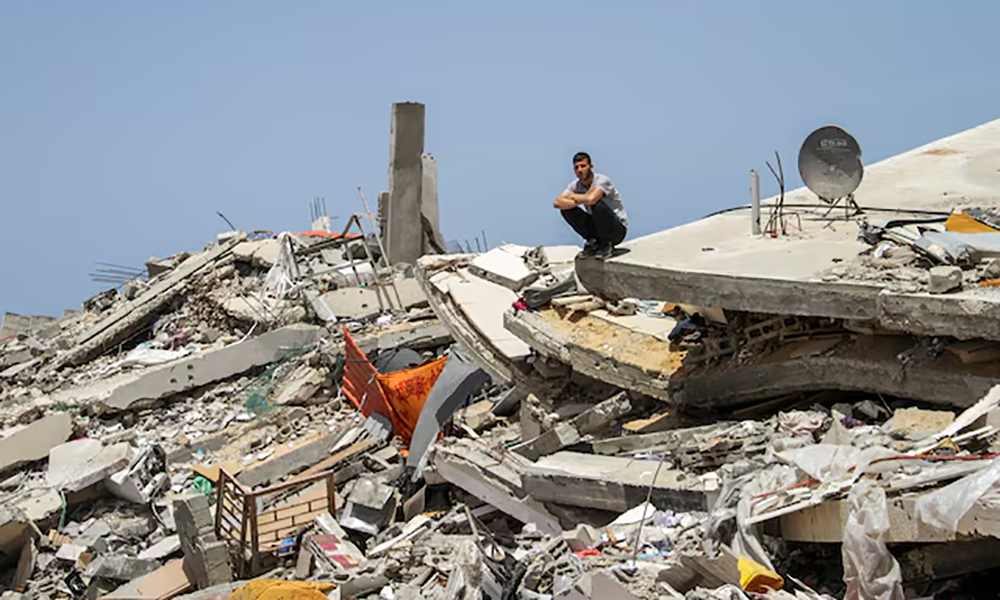
Turkey on Wednesday accused the United States of having a policy of double standards on human rights, saying Washington’s annual rights report failed to reflect Israel’s assaults in Gaza, Reuters reported.
Turkey’s foreign ministry said in a statement it was deeply concerned that the U.S. report did not “duly reflect the ongoing inhumane attacks in Gaza”.
The report was prepared with “political motives, far from impartiality and objectivity”, it said, calling on Washington to cease its “double-standard policy on human rights”.
It also cited U.S. ties with the Syrian Kurdish YPG militia which Ankara deems a terrorist organisation.
Israeli forces have killed more than 34,000 Palestinians in Gaza, according to health authorities there, many of them civilians and children. The enclave has been reduced to a wasteland and extreme food shortages have prompted fears of famine.
Israel launched its assault in response to an attack by the Hamas militant group on Oct. 7 in which Israel says 1,200 people were killed. It denies allegations of deliberately causing humanitarian suffering and targeting civilians.
Turkey has denounced Israel for its campaign in Gaza and called for a ceasefire. It has also criticised Western countries for what it calls their unconditional support of Israel, read the report.
In its report, the U.S. State Department said Israel’s war against Hamas had a “significant negative impact” on the human rights situation in Israel.
On Monday, U.S. Secretary of State AntZony Blinken rejected suggestions that Washington might have double standards over Israel’s record.
-

 Latest News4 days ago
Latest News4 days agoRashid Khan named AWCC’s brand ambassador
-

 World4 days ago
World4 days agoMalaysian navy helicopters collide in mid-air, 10 killed
-

 Sport4 days ago
Sport4 days agoJaiswal ton powers Rajasthan to big IPL win
-

 World3 days ago
World3 days agoNorth Korea officials visit Iran in a rare public trip
-

 Sport4 days ago
Sport4 days agoMawj Sahil player scores stunning halfway line goal in 1-0 win over Jawanan Wahedi
-

 Latest News4 days ago
Latest News4 days agoAt least 1,500 families affected by recent floods: IRW
-

 Sport3 days ago
Sport3 days ago‘Serious talent’ Fraser-McGurk bonds with Warner to light up IPL
-

 Latest News4 days ago
Latest News4 days agoUS report cites ‘significant deterioration’ in Afghan women’s rights last year




